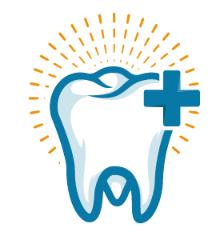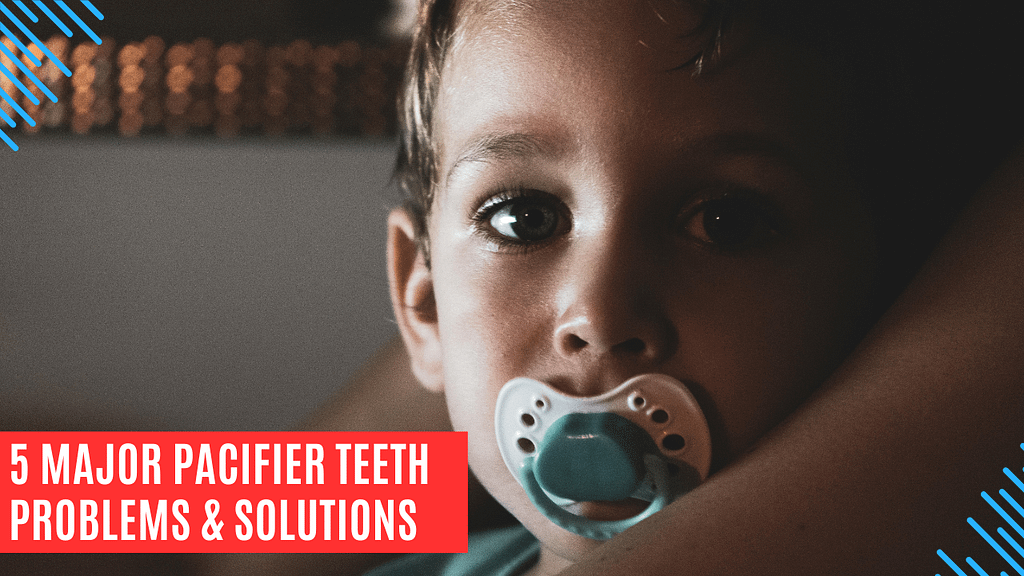Pacifiers are soothers for baby teeth that can be problematic if used without attention. Their continuous use in babies results in various pacifier teeth problems that need dental treatments. If you are a first-time parent and use pacifiers for your kid’s gums, this blog is for you.
Explore more oral directions, and parent guides about baby teething stages, such as pacifier teeth in toddlers, how to remove coffee stains from teeth, and much more.
Explore our blog to find excellent tips and tricks for maintaining oral regimes in kids, ways to treat unhealthy gums in kids, how to kill tooth nerve pain in 3 seconds permanently, and how to stop cavities from growing. Moreover, find toddler teeth charts and expert tips to control dental phobia in kids.
Pacifier Impact on Teeth:
For the parents who are not aware of this concept, pacifier teeth are the ones that are damaged by extensive use of pacifiers. The teeth’ disposition and loss of their original position.
Moreover, the teeth protrude on the front and mess up smiles in babies. Further, they affect gums, change the roof of the mouth, and create substantial bite issues, including open bite, overbite, crossbite, and more.
Thumb Sucking Vs Pacifier
As per the American Academy of Pediatric Dentistry, thumb-sucking and pacifiers both soothe infants, but thumb-sucking is self-directed and harder to stop. Pacifiers can be easier to manage and wean off but may affect dental development if used excessively. Each has pros and cons, depending on the child’s needs and parental preferences.
5 Major Signs of Pacifier Teeth
There are some significant issues caused by using pacifiers in babies and toddlers. There are essential drawbacks, from reshaping the teeth to tooth decay and causing cavities. Here, we share the significant signs showing pacifiers’ effect on teeth.
Further, to fix the issue, we also present a solution that can help parents catch the problems early and move to the solution quickly.
1. Tooth Decay
When a child sucks on a pacifier, saliva can accumulate around their teeth, fostering bacteria growth that can lead to decay. Initial signs may include brown or white spots on the teeth.
Additionally, sensitivity to hot or cold foods and discomfort while chewing are indications that your child might be susceptible to developing pacifier-related dental problems.
How to Fix:
The best way to deal with tooth decay after pacifier use is to quit. Secondly, the best way is to focus on the cleaning of teeth. Brushing and flossing teeth regularly is the best choice for adults. Using a finger brush regularly after each feed is highly recommended for toddlers.
2. Gum Irritation
Prolonged pacifier use can cause gums redness, inflammation, and irritation due to constant rubbing. This inflammation can make your child’s gums sore and, if untreated, could progress to gum disease.
In such cases, recognizing signs of gum irritation should prompt consideration of modifying pacifier habits to prevent future dental issues.
How to Fix:
To fix the gum irritation caused by pacifier use, the first approach is to quit its use in babies. During the tooth eruption, gums are already sensitive. Parents must massage their gums with oil or toothpaste to soothe their gums.
3. Abnormal Tooth Positioning
The continuous use of a pacifier can contribute to misalignment of the teeth, such as open bites or overbites, which may become evident over time.
In addition, sometimes some trauma or accident results in tooth damage, and pacifiers aid the damage, resulting in changing certain tooth positions, creating spacing issues for new erupting teeth, and unnecessary gaps.
How to Fix:
There is no quick treatment to fix babies’ abnormal positioning in teeth after using a pacifier. However, their teeth can be fixed later in life. Once they develop mature and permanent teeth, you can look for viable options such as traditional braces and Invisalign.
4. Jaw Misalignment
Prolonged pacifier use can sometimes lead to improper jaw alignment, which may affect how the upper and lower teeth fit together when the mouth is closed. This misalignment can gradually become more pronounced with continued pacifier use.
How to Fix:
Jaw misalignment is a significant complication that results in bite issues. It is fixable when the kids become teenagers. For jaw alignment, the best solution is getting traditional braces.
5. Speech Development Issues
Lastly, its excessive use might interfere with young children’s natural speech and articulation development. Parents may notice delays or difficulties in their child’s ability to form certain sounds or words properly.
How to Fix:
Speech therapy can help kids in their learning phase to overcome this issue. If a pacifier causes any such problem, parents must look for speech therapists to help their kids speak the words.
Pacifier Dos & Don’ts
Dos
- Start early by introducing the pacifier during the first few weeks if you choose to use one.
- Keep it clean by always washing it with soap and water before giving it to your baby.
- Check regularly for any cracks or damage and replace it if needed.
- Limit use by giving the pacifier mainly for soothing and not as a constant accessory.
- Wean gradually by beginning to reduce pacifier use around your baby’s first birthday to make the transition easier.
Don’ts
- Avoid overusing the pacifier by not letting your baby have it all day long, which can prevent potential dental issues.
- Don’t share pacifiers between babies to prevent the spread of germs.
- Don’t use the pacifier to replace feedings or a constant comfort item.
- Never dip the pacifier in honey, sugar, or other sweet substances.
- Consult a pediatrician or orthodontist if you notice any dental issues or persistent use.
When Should Your Baby Stop Using a Pacifier?
The sooner your child learns to go without a pacifier, the lower the risk of dental issues associated with prolonged use. During the first two years of life, children undergo rapid growth, and anything they hold onto for extended periods can impact their oral development. Prolonged pacifier use can influence the growth and alignment of their jaws.
Additionally, excessive pacifier use can lead to dental problems such as crooked teeth and bite issues. Common bite problems linked to overuse include underbite, overbite, and crossbite.
Will Pacifiers Teeth Correct Themselves?
Parents often ask the pediatric dentist if pacifier teeth will fix themselves. If you notice the issue early and stop your baby from using a pacifier soon, there’s a good chance their teeth will correct independently. But if your child continues to use a pacifier for a long time, the teeth might not fix themselves completely.
If the problem persists, consulting an orthodontist is a good idea. They can help address the damage and improve your child’s dental alignment. Remember that the extent of correction can vary depending on the severity of the issue.
Take away:
Monitoring these additional symptoms alongside the early signs of tooth decay, gum irritation, and abnormal tooth positioning can help parents identify potential issues related to pacifier use early on and take appropriate steps to mitigate them.
To get professional help, parents must contact the orthodontist who offers services to fix kids’ teeth. Discuss all your concerns with the dentist and look for options. Follow their professional guide and tips to avoid other gaping and spacing issues in kids.
FAQs
Do teeth go back to normal after the pacifier?
Yes, teeth return to normal, but with significant strategies and treatments such as weaning off the pacifier, using braces for a long time, and more.
At what age does a pacifier affect teeth?
It starts affecting the teeth in toddlers, starting at one year old. From 1 year of age to 3 years of age, it has a significant effect on the mouth.
Do pacifier teeth correct themselves?
They only correct themselves once you apply significant techniques such as braces. Long-term braces use helps with the gaps, spacing, jaw misalignment, and teeth positions.
Does a pacifier help teething?
Pacifiers are specifically designed to soothe irritated gums in kids. When kids are in their teething stages, it helps them fulfill their excessive desire to chew everything.

